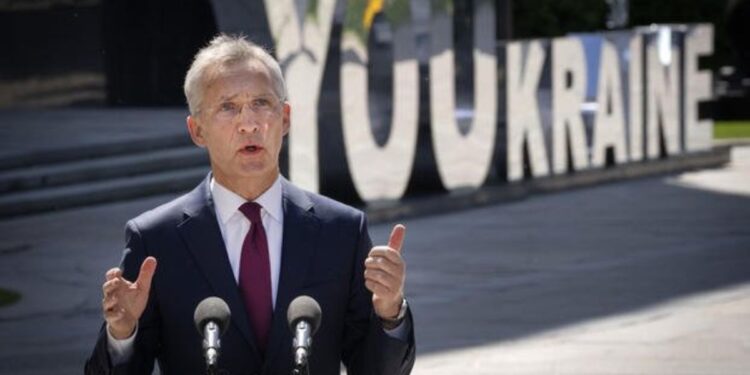NATO’s chief expressed his disappointment on Monday, stating that member countries have not fulfilled their promises to Ukraine in a timely manner. This comes as Russia seizes the opportunity to exploit its battlefield advantages while Kyiv’s forces await additional military supplies from Western allies. The ongoing conflict has already lasted for over two years, and the urgency for support grows with each passing day.
NATO Secretary-General Jens Stoltenberg expressed his concern over the significant impact on the battlefield for Ukraine due to the severe delays in support.
“NATO allies have failed to fulfill their promises,” stated Stoltenberg during a press conference in Kyiv alongside Ukrainian President Volodymyr Zelenskyy. Stoltenberg specifically highlighted the delays in the delivery of weapons and ammunition from the U.S. and Europe.
NATO Secretary General, Jens Stoltenberg, emphasized that the shortage of ammunition has played a significant role in enabling the Russian forces to advance on the front line. Furthermore, the absence of air defense has left targets vulnerable to a greater number of Russian missile strikes. Another critical factor is the lack of deep strike capabilities, which has allowed the Russians to concentrate their forces more effectively. Stoltenberg’s statement highlights the detrimental impact these deficiencies have had on NATO’s ability to counter Russian aggression.
Ukraine and its Western allies are working urgently to deliver essential military assistance in order to counter the ongoing Russian advance in eastern regions. This aid is crucial in deterring drone and missile attacks and stopping the steady but costly progress made by the Russian forces.
Zelenskyy emphasized the need to expedite the process of delivering new Western supplies, acknowledging that while they have begun to arrive, it is happening at a slow pace.
The front line, which spans 1,000 kilometers (600 miles), has seen minimal changes since the start of the war. However, the forces of the Kremlin have been gradually advancing in recent weeks, particularly in the Donetsk region. This progress has been achieved through their overwhelming numbers and the immense firepower they have employed to overcome defensive positions.
Kyiv’s Western allies have made consistent pledges to support Ukraine “for as long as necessary.” However, due to political disagreements in Washington, crucial military assistance from the United States was delayed for six months, while Europe’s military hardware production struggled to meet the growing demand. On the other hand, Ukraine’s own production of heavy weapons is just beginning to gather momentum.
Russia, being a significantly larger country than Ukraine, possesses a wealth of resources at its disposal. Moreover, according to the U.S. government, Russia has received military support from Iran and North Korea.
According to military analysts, Ukraine’s war effort is being undermined by a number of factors, including the prolonged efforts to mobilize more troops and the delayed construction of battlefield fortifications.
NATO Secretary General Stoltenberg announced that additional weapons and ammunition will be sent to Ukraine, including Patriot missile systems. These systems will provide defense against the intense Russian attacks that target the power grid and urban areas.
Ukrainian officials claim that Russia is currently gathering forces for a significant summer offensive, despite the fact that its troops are currently achieving only gradual progress. This suggests that additional assistance may be required in the near future.
According to a recent assessment by the Institute for the Study of War, it is stated that Russian forces are not expected to make any significant advancements in the area in the near future.
The strategically important hilltop town of Chasiv Yar is facing encroachment from the Kremlin’s forces, signaling a significant advancement into the Donetsk region.
According to the army chief of Ukraine, the troops in the embattled eastern region were forced to strategically withdraw from three villages.
Donetsk and Luhansk make up a significant portion of the industrial Donbas region, which has been engulfed in separatist conflict since 2014. This region has become a primary target of the Russian invasion, with Russia unlawfully annexing areas in Donetsk, Kherson, Luhansk, and Zaporizhzhia regions in September 2022.










